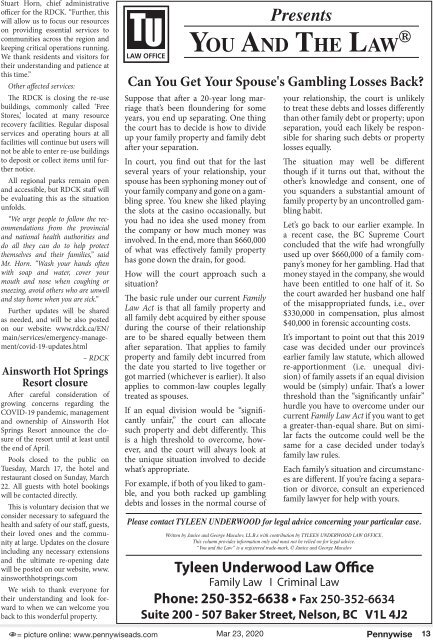March 23, Pennywise – Trail, Beaver Valley, Rossland
Complete coverage of Trail, Rossland, Fruitvale, Montrose.
Complete coverage of Trail, Rossland, Fruitvale, Montrose.
Create successful ePaper yourself
Turn your PDF publications into a flip-book with our unique Google optimized e-Paper software.
Stuart Horn, chief administrative<br />
officer for the RDCK. “Further, this<br />
will allow us to focus our resources<br />
on providing essential services to<br />
communities across the region and<br />
keeping critical operations running.<br />
We thank residents and visitors for<br />
their understanding and patience at<br />
this time.”<br />
Other affected services:<br />
The RDCK is closing the re-use<br />
buildings, commonly called ‘Free<br />
Stores,’ located at many resource<br />
recovery facilities. Regular disposal<br />
services and operating hours at all<br />
facilities will continue but users will<br />
not be able to enter re-use buildings<br />
to deposit or collect items until further<br />
notice.<br />
All regional parks remain open<br />
and accessible, but RDCK staff will<br />
be evaluating this as the situation<br />
unfolds.<br />
“We urge people to follow the recommendations<br />
from the provincial<br />
and national health authorities and<br />
do all they can do to help protect<br />
themselves and their families,” said<br />
Mr. Horn. “Wash your hands often<br />
with soap and water, cover your<br />
mouth and nose when coughing or<br />
sneezing, avoid others who are unwell<br />
and stay home when you are sick.”<br />
Further updates will be shared<br />
as needed, and will be also posted<br />
on our website: www.rdck.ca/EN/<br />
main/services/emergency-management/covid-19-updates.html<br />
<strong>–</strong> RDCK<br />
Ainsworth Hot Springs<br />
Resort closure<br />
After careful consideration of<br />
growing concerns regarding the<br />
COVID-19 pandemic, management<br />
and ownership of Ainsworth Hot<br />
Springs Resort announce the closure<br />
of the resort until at least until<br />
the end of April.<br />
Pools closed to the public on<br />
Tuesday, <strong>March</strong> 17, the hotel and<br />
restaurant closed on Sunday, <strong>March</strong><br />
22. All guests with hotel bookings<br />
will be contacted directly.<br />
This is voluntary decision that we<br />
consider necessary to safeguard the<br />
health and safety of our staff, guests,<br />
their loved ones and the community<br />
at large. Updates on the closure<br />
including any necessary extensions<br />
and the ultimate re-opening date<br />
will be posted on our website, www.<br />
ainsworthhotsprings.com<br />
We wish to thank everyone for<br />
their understanding and look forward<br />
to when we can welcome you<br />
back to this wonderful property.<br />
Presents<br />
YOU AND THE LAW ®<br />
LAW OFFICE<br />
Can You Get Your Spouse's Gambling Losses Back?<br />
Suppose that after a 20-year long marriage<br />
that’s been floundering for some<br />
years, you end up separating. One thing<br />
the court has to decide is how to divide<br />
up your family property and family debt<br />
after your separation.<br />
In court, you find out that for the last<br />
several years of your relationship, your<br />
spouse has been syphoning money out of<br />
your family company and gone on a gambling<br />
spree. You knew she liked playing<br />
the slots at the casino occasionally, but<br />
you had no idea she used money from<br />
the company or how much money was<br />
involved. In the end, more than $660,000<br />
of what was effectively family property<br />
has gone down the drain, for good.<br />
How will the court approach such a<br />
situation?<br />
The basic rule under our current Family<br />
Law Act is that all family property and<br />
all family debt acquired by either spouse<br />
during the course of their relationship<br />
are to be shared equally between them<br />
after separation. That applies to family<br />
property and family debt incurred from<br />
the date you started to live together or<br />
got married (whichever is earlier). It also<br />
applies to common-law couples legally<br />
treated as spouses.<br />
If an equal division would be “significantly<br />
unfair,” the court can allocate<br />
such property and debt differently. This<br />
is a high threshold to overcome, however,<br />
and the court will always look at<br />
the unique situation involved to decide<br />
what’s appropriate.<br />
For example, if both of you liked to gamble,<br />
and you both racked up gambling<br />
debts and losses in the normal course of<br />
your relationship, the court is unlikely<br />
to treat these debts and losses differently<br />
than other family debt or property; upon<br />
separation, you’d each likely be responsible<br />
for sharing such debts or property<br />
losses equally.<br />
The situation may well be different<br />
though if it turns out that, without the<br />
other’s knowledge and consent, one of<br />
you squanders a substantial amount of<br />
family property by an uncontrolled gambling<br />
habit.<br />
Let’s go back to our earlier example. In<br />
a recent case, the BC Supreme Court<br />
concluded that the wife had wrongfully<br />
used up over $660,000 of a family company’s<br />
money for her gambling. Had that<br />
money stayed in the company, she would<br />
have been entitled to one half of it. So<br />
the court awarded her husband one half<br />
of the misappropriated funds, i.e., over<br />
$330,000 in compensation, plus almost<br />
$40,000 in forensic accounting costs.<br />
It’s important to point out that this 2019<br />
case was decided under our province’s<br />
earlier family law statute, which allowed<br />
re-apportionment (i.e. unequal division)<br />
of family assets if an equal division<br />
would be (simply) unfair. That’s a lower<br />
threshold than the “significantly unfair”<br />
hurdle you have to overcome under our<br />
current Family Law Act if you want to get<br />
a greater-than-equal share. But on similar<br />
facts the outcome could well be the<br />
same for a case decided under today’s<br />
family law rules.<br />
Each family’s situation and circumstances<br />
are different. If you’re facing a separation<br />
or divorce, consult an experienced<br />
family lawyer for help with yours.<br />
Please contact TYLEEN UNDERWOOD for legal advice concerning your particular case.<br />
Written by Janice and George Mucalov, LL.B.s with contribution by TYLEEN UNDERWOOD LAW OFFICE.<br />
This column provides information only and must not be relied on for legal advice.<br />
“You and the Law” is a registered trade-mark. © Janice and George Mucalov<br />
Tyleen Underwood Law Office<br />
Family Law I Criminal Law<br />
Phone: 250-352-6638 • Fax 250-352-6634<br />
Suite 200 - 507 Baker Street, Nelson, BC V1L 4J2<br />
= picture online: www.pennywiseads.com Mar <strong>23</strong>, 2020 <strong>Pennywise</strong> 13


















